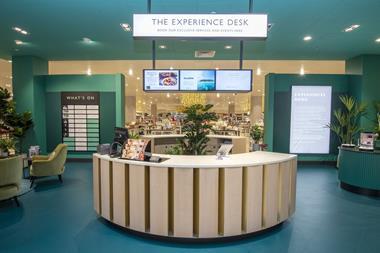While upskilling staff is the top in-store investment priority for 38% of retailers in the UK, France and Italy over the next three years, they also acknowledge the need for investment in other areas.
The Twitter poll by Retail Week, in association with Aptos, showed that investment in food, entertainment and personalised experiences in store were also of high priority for retailers, taking around 25% of the vote each.
“In-store experiences require a complete overhaul to keep up with consumer expectations”
This exemplifies a general acceptance by retailers that in-store experiences require a complete overhaul to keep up with consumer expectations.
Such experiences require highly trained staff, equipped for both technological changes and digitally savvy consumers with expectations of personalised service.
Retailers wishing to thrive in the experience era need to both upskill their store associates and offer radical and specialised experiences to keep customers loyal.
Fear of missing out
Research from Adweek found that more than two-thirds of millennials (69%) admit to a fear of missing out, and their spending patterns demonstrate a shift away from goods and services towards events and experiences.
Retailers therefore need to offer these in addition to the standard expectation of good products at competitive prices.
There are five keys to creating relevant experiences that will fit within a brand’s ethos and appeal to its customer base:
- Protection: Consumers must feel they can trust the brand and its values, and feel secure doing business with them.
- Purpose: Brands that have a public, identifiable purpose will resonate more with consumers and persuade them to keep coming back.
- Pride: Consumers should feel proud of and inspired by products and experiences in-store, spreading positive feedback to others.
- Partnership: Customers need to feel as though their feedback is taken into account.
- Personalisation: Whether it’s personal shopping in-store or personalised marketing communications tailored to a customer’s taste, retailers must create shopping experiences to suit the individual and make them feel special.
With these in mind, experiences must be in line with brand values and purpose. In fact, Accenture Strategy research found that 47% of consumers would abandon a brand that lacks purpose.
Tech to suit the store
Adidas’ new London flagship is an experiential playground with more than 100 digital touchpoints across the four-storey store.
Features such as interactive changing-room mirrors and geofence tracking, where a customer can scan a product, check the stock, order and purchase on the spot from their phone, are just some of the ways technology is driving a seamless in-store experience.
Adidas also has a customisation zone, MakerLab, and interactive screens where customers can sign up to receive notifications of new product releases – connecting in-store technology with personal and mobile.
“Retailers looking to gain and retain customers need to invest in personalised and exciting experiences that are relevant to their brand ethos, leveraging technology and involving expert staff”
Retailers looking to better access their target customers could also make use of new technologies such as these.
A fashion store, for example, could use facial recognition to understand an individual customer’s purchase history and artificial intelligence to predict how they wish to be approached and what they are likely to purchase.
This personalised approach would require highly trained staff who can access and understand customer histories.
Retailers looking to gain and retain customers need to invest in personalised and exciting experiences that are relevant to their brand ethos, leveraging technology and involving expert staff.
This is the only way to win long-term in the experience economy.
Aptos believes that integrating the whole shopping journey is essential for delivering omnichannel experiences. Read more here.






























No comments yet